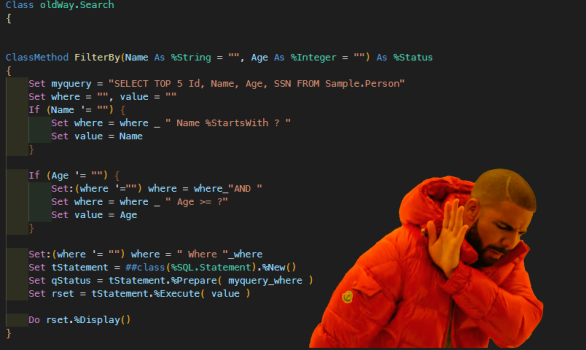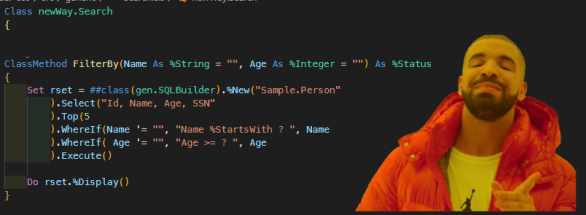SQLBuilder is a flexible and powerful SQL query string builder for InterSystems IRIS,
With SQLBuilder you have nice and clean object oriented methods, instead of having to use concatenation and substituition to generate dynamic queries.
A Dynamic SQL without SQLBuilder

A Dynamic SQL with SQLBuilder

If you like it, don't forget to vote in the IRIS Programming Contest

Hello @Henry Pereira !
I think you created a fantastic tool with a great potential and roadmap.
I think your product is very wished by developers. Thank you to bring and share modern approaches to work with SQL.
Thank you very much @Maks Atygaev
Hi @Henry.Pereira
Excellent tool, thanks for sharing with the community
👍
My preferred approach is using a Query class element.
Here's how it can look like:
Class Sample.Person Extends %Persistent { Property Name As %String; Query ByName(name As %String = "") As %SQLQuery { SELECT ID, Name FROM Sample.Person WHERE (Name %STARTSWITH :name) ORDER BY Name } ClassMethod Try(name) { set rset = ..ByNameFunc(name) do rset.%Display() } }Short and concise.
Hi @Eduard Lebedyuk
Yes, you are totally right. Using query class element will be concise and faster.
The point to use dynamic query are when the user choose the parameters to you do the query.
Using my simple example, when the method receive a name param or a age param to build the where clause. I really don't know how to solve it using query class.
In my $0.02 maybe will create an ByName and a ByAge methods, and another to combine both.
Like I said, it's a simple example that can solved by an OR, but in a complex report with the user need to choose by parameters use dynamic query could be an alternative
Query FilterBy( Name As %String = "", Age As %Integer = "") As %SQLQuery(CONTAINID = 1, SELECTMODE = "RUNTIME") [ SqlName = SP_Sample_Filter_By, SqlProc ] { SELECT TOP 5 ID, Name, Age, SSN FROM Sample.Person WHERE (nvl(:Name,'')='' or Name %STARTSWITH :Name) AND (nvl(:Age,'')='' or Age >= :Age) } Run Examples: select * from Sample.SP_Sample_Filter_By(,47) select * from Sample.SP_Sample_Filter_By('',47) select * from Sample.SP_Sample_Filter_By('s',47) select * from Sample.SP_Sample_Filter_By('s') select * from Sample.SP_Sample_Filter_By('s','')cool, thank @Vitaliy.Serdtsev for the enlightenment
But will it use a name or age index? Age index bad example but hey. Sqlquery is a class so you can extend/replace it. We came up with a syntax where the sql would generate based on the parameters. So you could do
SELECT TOP 5 ID, Name, Age, SSN FROM Sample.Person WHERE 1=1 --If Name'="" And Name %STARTSWITH :Name --endif --if Age'="" AND Age >= :Age --endifWhat about this dynamic discarding of SQL criteria based on empty parameters extending %SQLQuery?
Class gen.SmartSQLQuery Extends %Library.SQLQuery { ClassMethod Func() As %SQL.StatementResult [ CodeMode = generator, ProcedureBlock = 1, ServerOnly = 1 ] { set %code=0 // don't generate any code if it not for a query if %mode="method" quit $$$OK // %mode is "propertymethod" for a valid query. We don't have any way currently to detect a misuse of a query class if '$$$comMemberDefined(%class,$$$cCLASSquery,%property) quit $$$OK // Reset the formal list to the query declaration: $$$comSubMemberKeyGetLvar(formal,%class,$$$cCLASSquery,%property,$$$cQUERYmethod,%method,$$$cMETHformalspecparsed) $$$comMemberKeyGetLvar(qformal,%class,$$$cCLASSquery,%property,$$$cQUERYformalspecparsed) $$$comSubMemberKeySet(%class,$$$cCLASSquery,%property,$$$cQUERYmethod,%method,$$$cMETHformalspecparsed,formal_qformal) Set glbArgList = formal_qformal Set publicList = "" For i=1:1:$ListLength(glbArgList) { Set $Piece(publicList,",",i) = $List($List(glbArgList,i),1) } Set publicList = publicList _ "," _ "tStatement" _ "," _ "tResult" $$$comSubMemberKeySet(%class,$$$cCLASSquery,%property,$$$cQUERYmethod,%method,$$$cMETHpubliclist,publicList) set sc=$$SetOneQueryMeth^%occQuery(%class,%property,%method) quit:$$$ISERR(sc) sc $$$comMemberKeyGetLvar(origin,%class,$$$cCLASSquery,%property,$$$cXXXXorigin) $$$comMemberKeyGetLvar(query,%class,$$$cCLASSquery,%property,$$$cQUERYsqlquery) // preparse the query to construct the actual argument list. If more than the supported number of arguments then revert to // the non-dynamic option set query = $zstrip(query,"<W") set tLines = 0 for tPtr = 1:1:$Length(query,$$$NL) { set tLine = $Piece(query,$$$NL,tPtr) if tLine '= "" { set tLines = tLines + 1, tLines(tLines) = tLine } } set sc=$$ExpandMacros^%SYS.DynamicQuery(%class,.tLines) QUIT:$$$ISERR(sc) sc set SQLCODE = $$dynamic^%qaqpreparser(.tLines,.tStatementPreparsed,.tStatementArgs) $$$GENERATE($Char(9)_"try {") $$$GENERATE($Char(9,9)_"Set query = """_$replace(query,$$$NL,"""_$C(13,10)_""")_"""") $$$GENERATE($Char(9,9)_"For i=1:1:$Length(query,$$$NL) {") $$$GENERATE($Char(9,9,9)_"Set line=$Piece(query,$$$NL,i)") $$$GENERATE($Char(9,9,9)_"If line?.E1"":""1.AN {") $$$GENERATE($Char(9,9,9,9)_"Set var=$Piece($Piece(line,"":"",2),"" "",1)") $$$GENERATE($Char(9,9,9,9)_"if @var="""" {") $$$GENERATE($Char(9,9,9,9,9)_"Set $Piece(query,$$$NL,i) = ""-- ""_line") $$$GENERATE($Char(9,9,9,9)_"}") $$$GENERATE($Char(9,9,9)_"}") $$$GENERATE($Char(9,9)_"}") $$$GENERATE($Char(9,9)_"set tLines = 0 for tPtr = 1:1:$Length(query,$$$NL) { set tLine = $Piece(query,$$$NL,tPtr) if tLine '= """" { set tLines = tLines + 1, tLines(tLines) = tLine } }") // $$$GENERATE($Char(9,9)_"set sc=$$ExpandMacros^%SYS.DynamicQuery(%class,.tLines) Throw:$$$ISERR(sc) ##class(%Exception.StatusException).ThrowIfInterrupt(sc)") $$$GENERATE($Char(9,9)_"set SQLCODE = $$dynamic^%qaqpreparser(.tLines,.tStatementPreparsed,.tStatementArgs)") $$$GENERATE($Char(9,9)_"//") $$$GENERATE($Char(9,9)_"set tSelectMode = """_$Case($$$ucase(%parameter("SELECTMODE")), "RUNTIME": "", "ODBC": 1, "DISPLAY": 2, "LOGICAL": 0, : "")_"""") $$$GENERATE($Char(9,9)_"if SQLCODE=0 && ($Listlength(tStatementArgs) < 361) && ($Length(tStatementPreparsed) < 40000) {") $$$GENERATE($Char(9,9,9)_"set tExecuteArgs = """" for tPtr=1:2:$ListLength(tStatementArgs) { set tArg = $Case($List(tStatementArgs,tPtr),""?"":""$g(%parm(""_$Increment(qcount)_""))"",""c"":$$quoter^%qaqpreparser($List(tStatementArgs,tPtr+1)),""v"":""$g(""_$List(tStatementArgs,tPtr+1)_"")"",:"""") Set tExecuteArgs = tExecuteArgs _ "","" _ tArg }") $$$GENERATE($Char(9,9,9)_"set tSchemaPath = ##class(%SQL.Statement).%ClassPath($classname())") $$$GENERATE($Char(9,9,9)_"set tStatement = ##class(%SQL.Statement).%New(tSelectMode,tSchemaPath)") $$$GENERATE($Char(9,9,9)_"do tStatement.prepare(tStatementPreparsed)") $$$GENERATE($Char(9,9,9)_"Xecute ""set tResult = tStatement.%Execute(""_$Extract(tExecuteArgs,2,*)_"")""") $$$GENERATE($Char(9,9)_"}") $$$GENERATE($Char(9)_"}") $$$GENERATE($Char(9)_"catch tException { if '$Isobject($Get(tResult)) { set tResult = ##class(%SQL.StatementResult).%New() } set tResult.%SQLCODE=tException.AsSQLCODE(),tResult.%Message=tException.AsSQLMessage() }") $$$GENERATE($Char(9)_"Quit tResult") QUIT $$$OK } }Query FilterBy( Name As %String = "", Age As %Integer = "") As %SQLQuery(CONTAINID = 1, SELECTMODE = "RUNTIME") [ SqlName = SP_Sample_Filter_By, SqlProc ] { SELECT TOP 5 ID, Name, Age, SSN FROM Sample.Person WHERE (nvl(:Name,'')='' or Name %STARTSWITH :Name) AND (nvl(:Age,'')='' or Age >= :Age) }This kind of query ends up preventing Caché SQL compiler from optimizing using index based on each of the criteria made optional.
That´s why I followed Paul´s idea and came up with %SQLQuery´s subclass SmartSQLQuery found above which dynamically comments out each criteria which is not applicable.
Query FilterBy( Name As %String = "", Age As %Integer = "") As %SQLQuery(CONTAINID = 1, SELECTMODE = "RUNTIME") [ SqlName = SP_Sample_Filter_By, SqlProc ] { SELECT TOP 5 ID, Name, Age, SSN FROM %ALLINDEX Sample.Person WHERE (:Name IS NULL or Name %STARTSWITH :Name) AND (:Age IS NULL or Age >= :Age) }What is your conclusion based on?
If you check the plans of this query for different combinations of parameters, then the corresponding indexes are used (it is assumed that the table was previously configured via TuneTable).
select * from Sample.SP_Sample_Filter_By('s')SELECT TOP 5 ID, Name, Age, SSN FROM %ALLINDEX Sample.Person WHERE ('s' IS NULL or Name %STARTSWITH 's') AND (NULL IS NULL or Age >= NULL)
select * from Sample.SP_Sample_Filter_By('s',47)SELECT TOP 5 ID, Name, Age, SSN FROM %ALLINDEX Sample.Person WHERE ('s' IS NULL or Name %STARTSWITH 's') AND (47 IS NULL or Age >= 47)
You´re right, @Vitaliy Serdtsev
In my test I had used a particular huge table of people with non-default mapping (legacy globals) and with a very specific and custom name index for which nvl(:Name,'') = '' inhibited the index.
But with this plain :Name IS NULL it worked fine.
Thanks a lot!
Method chains look nice. Very interesting project, Henry. Well done!
Thank you very much @Evgeny Shvarov
Hello @Henry Pereira
How can I learn more about this?
You can take a look on Henry's demonstration here: https://www.youtube.com/watch?v=d83vF7B7Tm4&t=215s&ab_channel=InterSyste...
Hi, yes you can see a demonstration on video that @Henrique.Dias
shared ( BTW thanks a lot). Or you can read the documentation here , with a lot of examples.